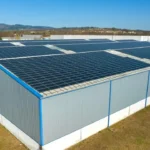Table of Contents
Solar Panel Business Subsidy in India is gaining massive attention in 2025 as the government intensifies its push for renewable energy. With growing awareness, rising energy demands, and substantial policy support, this sector is booming. Entrepreneurs, startups, and even large enterprises are now leveraging government incentives to kickstart their ventures. In this article, we’ll explore the top 7 subsidy schemes, offer practical guidance, and include ideas such as solar business grant in India, solar startup subsidy, and green energy incentives .
The Solar Panel Business Subsidy in India (2025) includes central and state-level incentives like the MNRE Capital Subsidy, PM-KUSUM Yojana, State Solar Policies, and Renewable Energy Certificates. These programs offer financial support up to 90% in specific cases, enabling new and existing businesses to flourish in the solar energy domain.
1. MNRE Capital Subsidy Scheme
The Ministry of New and Renewable Energy (MNRE) offers capital subsidies up to 30% for installing solar power plants and rooftop panels. For residential and commercial buildings, this scheme reduces the overall cost of setup, making solar ventures highly feasible. The subsidy amount may vary based on system size and location.
2. PM-KUSUM Yojana
Designed for farmers and rural solar entrepreneurs, the PM-KUSUM scheme (Pradhan Mantri Kisan Urja Suraksha evam Utthaan Mahabhiyan) provides subsidies up to 60% for installing solar pumps and grid-connected solar plants. This is an excellent entry point for those looking to start a solar panel business in agricultural regions.
3. State-Specific Solar Policies
States like Gujarat, Maharashtra, Rajasthan, and Tamil Nadu offer additional incentives including land assistance, feed-in tariffs, and zero electricity duty. Entrepreneurs must check their state government portals for updated guidelines and policy documents.
4. IREDA Loan Assistance
The Indian Renewable Energy Development Agency (IREDA) provides low-interest loans for solar infrastructure. While this isn’t a direct subsidy, the cost-saving effect is significant. Combining IREDA loans with central subsidies greatly improves ROI.
5. Renewable Energy Certificates (RECs)
Businesses generating solar power can earn RECs which are tradable in energy markets. These certificates act as an indirect subsidy by creating a new income stream. RECs are especially beneficial for large-scale commercial projects.
6. Rooftop Solar Subsidy for MSMEs
Micro, Small and Medium Enterprises (MSMEs) can now avail up to 50% subsidy for installing rooftop solar systems under special industrial policies. This reduces operational electricity costs drastically, improving margins.
7. Startup India Green Initiative
Under the Startup India program, renewable energy startups including solar panel manufacturers and EPC firms can apply for grants, seed funding, and tax exemptions. These benefits give early-stage businesses a competitive edge.
Bonus Tips to Maximize Your Solar Panel Business Subsidy
- Combine Subsidy + Loan: Pairing subsidies with IREDA or SIDBI loans amplifies financial efficiency.
- Stay Updated: Regularly visit MNRE and state energy department websites for announcements.
- Hire Experts: Engage consultants who specialize in government schemes and solar certifications.
- Comply Fully: Follow all legal, environmental, and electrical standards to avoid disqualification.
- Track ROI: Use simple tools like Excel or ERP software to monitor subsidy impact on profits.
Estimated Cost and Subsidy Impact Table
| Setup Type | Average Cost | Subsidy (%) | Effective Cost After Subsidy |
|---|---|---|---|
| Residential Rooftop (3 kW) | ₹1,80,000 | 40% | ₹1,08,000 |
| Commercial Rooftop (10 kW) | ₹6,00,000 | 30% | ₹4,20,000 |
| Ground-Mounted (1 MW) | ₹4.5 Cr | 10% | ₹4.05 Cr |
Conclusion
With increasing demand for renewable energy and strong policy backing, the Solar Panel Business Subsidy schemes in India (2025) present unmatched opportunities. Entrepreneurs should act quickly to tap into these programs and create scalable, sustainable, and highly profitable businesses. This is the perfect time to align with India’s clean energy mission and become a part of a revolution that benefits both the planet and your profits.
FAQs about Solar Panel Business Subsidy in India
1. What is the maximum subsidy available under MNRE?
MNRE offers up to 30% capital subsidy depending on the system type and capacity.
2. Can startups avail multiple subsidies?
Yes, if eligible. Startups can combine state and central subsidies along with Startup India benefits.
3. Are there any subsidies for solar battery storage systems?
Currently, few pilot schemes support storage, but more initiatives are expected in late 2025.
4. Do banks consider subsidies while sanctioning loans?
Yes, banks factor in subsidies while assessing project viability, especially under PMEGP and IREDA schemes.
5. How long does it take to receive subsidy approval?
Approval timelines vary by scheme, but typically range from 30 to 90 days post-application.







